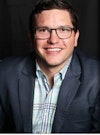Welcome to #BizUnited, a new series highlighting innovative partnerships between large corporations and small businesses across America. Check back periodically for new installments, and share your company's story on social media with the hashtag #BizUnited
Dave Krauss was the last one to find out about the party, and it cost him dearly.
Krauss, who was running an upstart real estate company at the time, had purchased, renovated and started renting a couple condominiums in Dallas for additional income. One weekend in 2012, two guests rented one of his properties, assuring Krauss they were looking forward to “a quiet weekend.”
It didn’t turn out that way.
“I had a nightmare — a hosting nightmare — happen to me,” Krauss recalls.
The next week, much to his surprise, a cease-and-desist letter from the building’s lawyers arrived in the mail. Come to find out, Krauss’s rental property had played host to, as he describes it, “a mini Coachella” over the weekend, with more than a dozen noise complaints and a police report on file. Krauss was no longer welcome in the building, and by the time in the ordeal was done, he was out about $30,000.

Once the dust had settled, Krauss started to wonder why no one had developed a solution for what must be a common challenge for renters amid the boom of the so-called sharing economy — and alas, out of an extraordinarily costly and embarrassing ordeal, an entrepreneurial seed was planted.
“There was nothing available on the market, so I thought, let me figure it out,” Krauss said.
Today, Krauss and his business partner, Andrew Schulz, an electrical engineer, are the founders behind NoiseAware, a Dallas-based startup that makes and monitors what they describe as “smoke detectors for noise” — basically small sound sensors (manufactured in Texas) that alert property owners when renters’ noise level exceeds some predetermined threshold. No longer would renters be the last to know when the speakers are blaring or a party was getting out of hand; instead, they would be the first to know.
Related: How GE and a Detroit Startup are Helping the NFL Tackle Concussions
NoiseAware has seen tremendous early success, thanks in large measure to partnerships Krauss and Schulz have struck with large and mid-sized companies in the home rental space, including most recently HomeAway, one of the largest vacation rental marketplaces in the world (now owned by Expedia). About two years ago at a conference in New Orleans, Krauss met Ashley Hodgini, a regional government affairs manager for HomeAway, and she quickly realized that NoiseAware’s product could help address one of the most common concerns communities raise about rental platforms like HomeAway or Airbnb.
“Nuisance is the first thing to come up,” Hodgini said at the U.S. Chamber’s Regional Affairs Conference earlier this year in Austin, noting that disruptive guests are rare but that even one incident can make local municipalities or neighborhoods wary of allowing rentals. “This is a good example of how you can address challenges like nuisance concerns without unnecessarily regulating an industry into the ground.”
HomeAway now lists NoiseAware’s sensors on its official partner products page online, and the two companies are currently running a pilot program in Charleston, Nashville and Seattle designed to gather and analyze data about noise issues that can help inform future solutions to address this challenge.

In addition, the two are working together on what’s known as the Stay Neighborly and Rent Responsibly campaigns. The Stay Neighborly Campaign is intended to educate property owners and managers on the local regulations that could affect a home rental, while the Rent Responsibly initiative helps stakeholders in the short-term rental community understand and embrace a sense of shared responsibility for preventing nuisance issues related to noise, trash, and parking.
“I love Dave’s story, he has a brilliant product, and we’ve built a great partnership,” Hodgini said.
Of course, the partnership has been a big win for Krauss and Schulz. In part spurred by that partnership, the company continues to grow rapidly, with NoiseAware now employing seven people and, in Krauss’s words, “party-pooping in 15 states and five countries around the world.”
“In a sense, we’ve combined our stories, with Homeaway, a very established company with a long history, partnering with a startup that can provide a new service and a solution to one of the growing pains of the sharing economy and the proliferation of these short-term rentals,” Krauss said. “It’s working very well.”
Read more #BizUnited stories here





